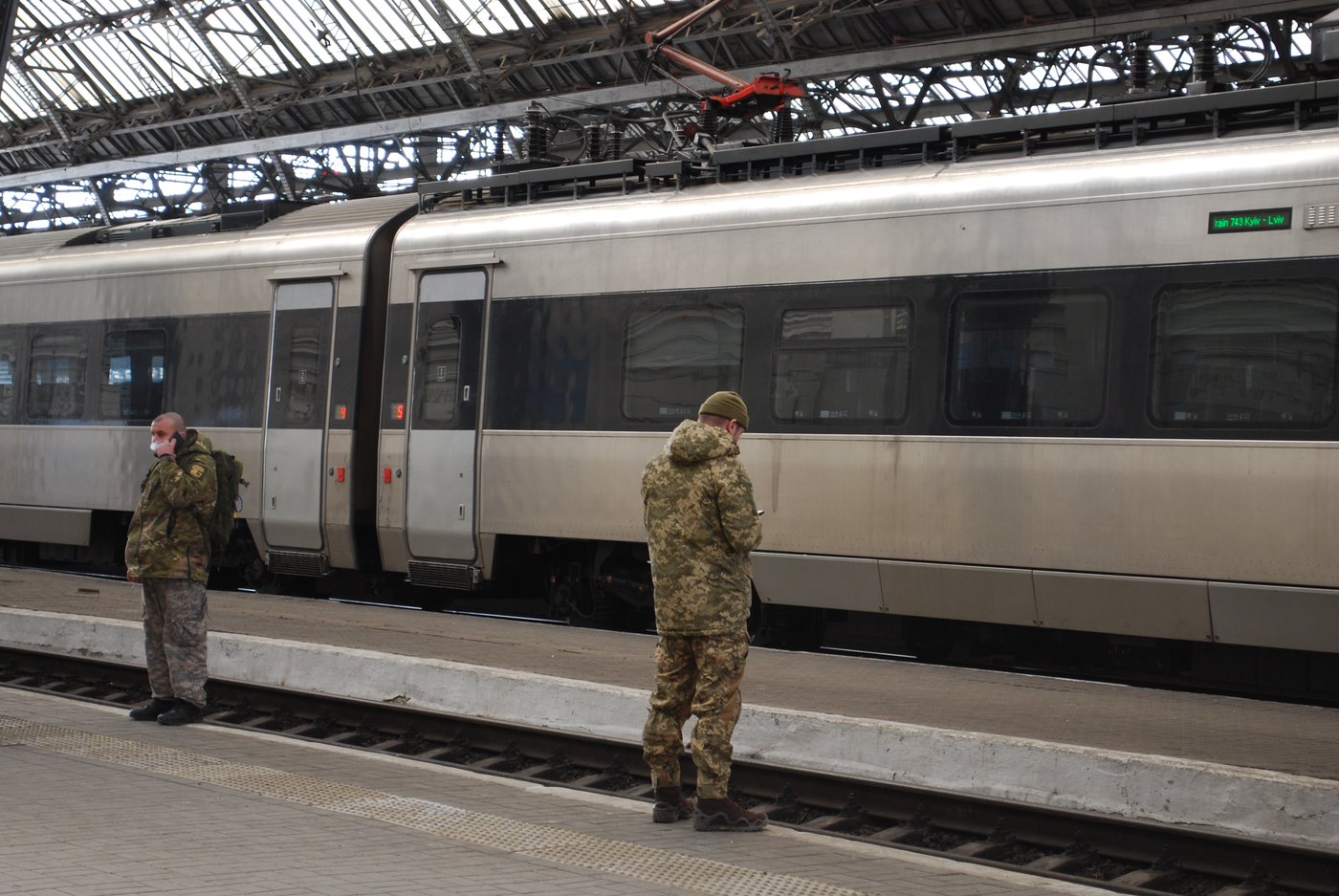Ukraine wants Canada to lend its expertise — and donate crucial railway parts — to keep its embattled passenger and cargo rail system running as landmines and missile strikes threaten to stall the country’s lifeline.
The rail system is vital to the war effort, and has been since the first days of the invasion that began one year ago this week.
Millions of people used trains to escape occupied cities and flee to neighbouring countries. Thousands of wounded soldiers and civilians were also transported by rail to hospitals in safer parts of the country.
The railway is also how Ukraine moves aid and soldiers to front-line areas, where the fighting is most intense, and restores residents and supplies to territories returned to Ukrainian control after the Russian occupying forces leave.
Constant attacks on rail and other critical infrastructure has rendered 20 per cent of the system unusable, said Oleksandr Pertsovskyi, the CEO of Ukrainian Railways’ passenger company. He added that more than 300 railworkers have also been killed.
“Very often they have to go right after the shelling ends, when it’s still dangerous, to start repairs,” he said in an interview from Kyiv, the capital city of Ukraine.
The state-owned rail company, known in Ukraine as Ukrzaliznytsia, has been operating almost as a paramilitary unit to keep essential goods and people moving from one end of the vast country to the other, Pertsovskyi said.
But Ukraine is looking to do more than repair what has been damaged, he said.
The company wants to build a better, more modern system, and it has asked for Canada’s help.
“Canada is a big industrial manufacturer, so of course there could be certain equipment types or certain technology solutions,” he said.
One of his goals is to make the gauge of the tracks — the distance between the two rails — more compatible with the standard in the rest of Europe. It would be no small feat, considering there is 20,000 km of track in Ukraine.
The railway also hopes to replace shattered stations with ones that will better serve Ukrainians after the war, including those with lasting disabilities.
“Unfortunately there’s so many, even young people, who get amputations because of this war, and our key task is to make our railway facilities fully accessible,” he said.
Canada could help with equipment, engineering and advice to rebuild damaged buildings up to accessibility standards, he said.
Canada’s Transport Minister Omar Alghabra helped broker an agreement last fall between Canadian rail companies and Ukrainian Railways in response to a request from the Ukrainian government to support the resiliency and reconstruction of the system, including sourcing parts from Canadian manufacturers.
“Our members are marshalling equipment and expertise to help our Ukrainian friends keep trains moving, despite Russia’s incursions, while also planning for the future,” Caroline Healey, executive vice-president of the Railway Association of Canada, said in a written statement.
The Railway Association of Canada represents Canada’s three major rail companies: Canadian National Railway, Canadian Pacific Railway and Via Rail, as well as Canadian rail manufacturers.
The association is working to figure out what parts Ukraine needs most, and where to get them in Canada.
Pertsovskyi said workers in Ukraine have already repaired hundreds of kilometres of tracks and nearly a dozen bridges that have been damaged in the war. He said sometimes, though, they are just temporary fixes.
The most notable example might be the major bridge between Kyiv and the nearby suburb of Irpin, which was occupied by Russian forces at the very start of the war. Ukrainian forces destroyed the bridge over the Irpin River that connected the two cities to prevent Russian tanks from advancing into the capital.
“It’s like major, major destruction,” Pertsovskyi said. “The river is beneath the bridge and it was completely like blown apart.”
Once Russian troops were pushed out of the suburb, it took the country less than a month to restore commuter rail service, he said. Meanwhile, the bridge between the port city of Odessa and the nearby region of Bessarabia has been attacked more than 30 times.
“They keep attacking it and (they’re) still not able to completely stop the operation,” Pertsovskyi said.
The work comes at an enormous human cost. Landmines left behind after the Russians leave make repairs incredibly dangerous for workers.
Missile attacks on power stations have also made it difficult to keep trains running, though deploying diesel trains during power outages now happens quickly and smoothly, he said.
Stations such the one in Lviv have been transformed into what Pertsovskyi calls “invincibility fortresses,” where people from the city can come to warm up, charge their electronic devices and sleep on station benches when Russian bombing cuts the power to communities.
Though the tent city of refugees and social services that were outside of Lviv Station is now mostly packed up and gone, one tent remains. There, volunteer Roman Mazur, among others, sleeps when he is not handing out hot tea to travellers leaving or returning to Ukraine.
Inside, the tent is piled high with boxes of food and other supplies to help people along their journey.
“Most people leave the country when the Russians start bombing heavily. A lot of people flee from those cities (that are bombed),” Mazur said in Ukrainian through a translator as he handed out a box of pastries to people arriving at the train station.
Three or four buses of refugees still depart for neighbouring Poland every day, said Mazur, who volunteers with the organization Lviv Angel.
The statues that flank the ornate entrance to the station are wrapped up to protect them against damage in case of nearby explosions, but still the trains run mostly on time.
As more territories are reclaimed, Pertsovskyi hopes to repair more rail lines leading to those towns and communities.
“Bringing life back to the occupied cities is now the top priority,” he said.
This report by The Canadian Press was first published Feb. 21, 2023.
